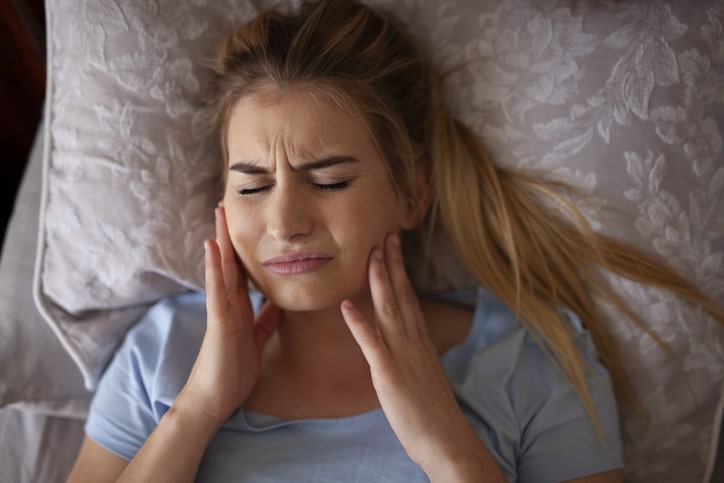Teeth Grinding (Bruxism) & Stress Induced Symptoms

We all clench our teeth at times. It could be something your boss is doing or some other stressful situation in your life. But those situations are fleeting. We relax and let our jaws relax with us.
Bruxism is a different story. Bruxism is when we grind our teeth. Usually done unbeknownst to us while we sleep, bruxism can cause our teeth to wear down, and can even chip or break a tooth.
At Gentle Dental, Dr. Strober and Dr. Butcofski treat bruxism and the damage it causes for our patients from Edison and the surrounding areas.
What Is Bruxism And How Common Is It?
There are two types of bruxism — awake bruxism and sleep bruxism. Both involve clenching of the teeth, gnashing, and grinding. These are done unconsciously. Awake bruxism is usually the result of emotions such as stress or anger. Clenching may be a coping strategy.
Sleep bruxism is considered to be a sleep-related disorder. People who grind their teeth while they sleep often have other sleep disorders such as sleep apnea.
Surprisingly, children have the highest rates of nightly teeth grinding. While statistics are hard to come by, it’s thought that almost half of children have at least a period where they grind their teeth at night. In adolescents, the prevalence of sleep bruxism is estimated to be around 15 percent. The numbers keep dropping with age, as around 8 percent of middle-aged adults have the condition and only 3 percent of older adults grind their teeth at night.
How Does Someone Develop Bruxism?
Bruxism isn’t completely understood, but it is caused by a combination of physical, psychological, and genetic factors. Because different factors can come into play, it’s usually not possible to identify a single cause behind a person’s teeth grinding.
Stress is the most significant risk factor. Clenching the teeth during daytime stress often carries over to episodes of sleep bruxism. Higher levels of anxiety are also connected to bruxism.

Sleep bruxism has a genetic component and seems to run in families. As many as half the people with sleep bruxism have a close family member who also has the condition.
Episodes of teeth grinding appear to be connected to changing sleep patterns or microarousals from sleep. Most teeth grinding is preceded by increases in brain and cardiovascular activity. That’s why there appears to be a connection between sleep bruxism and obstructive sleep apnea.
What Are The Short-Term And Long-Term Effects Of Bruxism?
Short-term bruxism doesn’t usually cause serious complications other than maybe having some jaw soreness the morning after a night with some sleep bruxism. Often, when the person eliminates or learns how to better cope with the stressors impacting their life, the teeth grinding goes away.
Severe, ongoing bruxism is different.
Sleep bruxism is the most common form of ongoing teeth grinding. When it continues over a long term this grinding can cause significant harm to your teeth. Teeth may become painful, eroded, and loose. Dental crowns, fillings, porcelain veneers, and implants can all become damaged from the pressures of nightly bruxism.
Beyond the teeth, bruxism also affects the temporomandibular joint (TMJ), the joint that connects the lower jaw to the skull. Problems with your TMJ can create chronic jaw pain, popping and clicking sounds when chewing, locking of the jaw, difficulty chewing, and other complications.
Beyond you, it’s likely nightly bruxism is also affecting the person sleeping next to you. Grinding can usually be heard throughout the night.
Does Stress Cause Bruxism?
Stress and anxiety are the most common risk factors for a person developing sleep bruxism. Aggressive, competitive, or hyperactive personality types suffer from the condition more often. Stressful occupations can lead to teeth grinding. Anxiety is an ongoing situation for some people, and this can lead to bruxism.
What People Say About Us!
Always professional, friendly, caring service. Would not go anywhere else for my dental care.
Eileen Catinello
Click here to read more reviews.
What Treatment Options Are Available For Bruxism?
The need for treatment can vary. For instance, many of us have temporary stresses enter our lives, and they may cause jaw clenching and tooth grinding. But these often resolve when the stress goes away. But when the signs of bruxism are obvious and your teeth are being degraded, Dr. Strober and Dr. Butcofski may use some of these treatments:
- Splints and mouth guards — We custom fit a mouth guard or splint whose job is to keep your teeth separated. This stops the ability of the teeth to meet and grind against each other. These fit over the upper and lower teeth.
- Dental correction — When a person has severe bruxism, their tooth wear has led to sensitivity, and it is affecting the bite. Now it’s necessary to place crowns over worn teeth. Inlays and onlays may also be successful.
- Stress management — Coping strategies allow the person to better handle the stress in their life, such as meditation.
- Behavior change — We can show you how your mouth and jaw should be positioned. You can then try and train your jaw to stay in this position.
- Biofeedback — This behavior modification system uses monitoring procedures and equipment to teach you how to control muscle activity in your jaw.
- Medications — In some patients, the best course may be medication. These mediations work to relax the muscles. Botox, in particular, is showing excellent results.
These are possible medications used for bruxism:
- Botox injections. Botox works by blocking nerve messages in the muscles. The brain doesn’t receive the message to contract the muscle, so the muscle stays relaxed. For bruxism, this calms the muscles responsible for clenching and grinding.
- Muscle relaxants. These can calm the muscles that clench your jaw and grind your teeth.
- Anxiety or stress medication. Short-term use of antidepressants or anti-anxiety medications can help you deal with stress or other emotional issues that are causing your bruxism.
What Are Some At-Home Remedies For Teeth Grinders?
Bruxism can be prevented with some lifestyle changes:
- Reduce stress — Exercise. Meditate. Take a warm bath. Find ways to handle your stress and keep it from making you tense.
- Avoid stimulants in the evening — Don’t drink caffeinated coffee or caffeinated tea after dinner, as this can worsen bruxism.
- Practice good sleep habits — Sound sleep typically doesn’t involve grinding.
- Talk with your sleep partner — Ask your partner if they are aware of any grinding or clicking sounds that you’re making while you’re sleeping. If so, be sure to tell us about it when you’re here for your regular cleanings and check-ups.
- Keep your twice-yearly professional exams and cleanings — Bruxism needs to be identified as early as possible to minimize tooth damage. Dr. Strober and Dr. Butcofski can spot signs during these regular exams and treat your bruxism.
Schedule A Consultation
If you’re suffering from stress and teeth grinding, our top-notch doctors Dr. Strober and Dr. Butcofski can discuss the causes of your symptoms and help determine a treatment plan that works for you. Contact us online or give us a call at 732.549.5660 to schedule a consultation in our Edison, NJ office located on Oak Tree Road.



